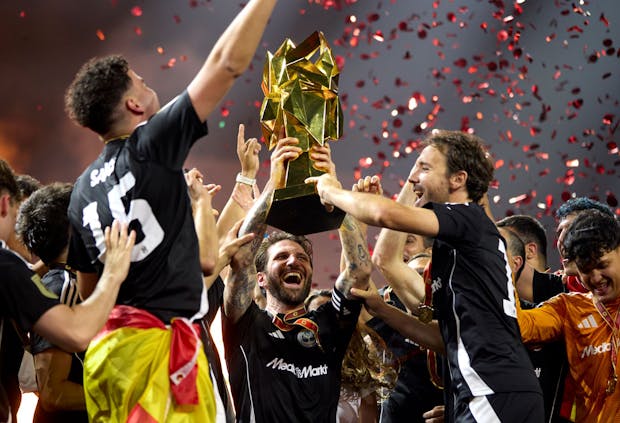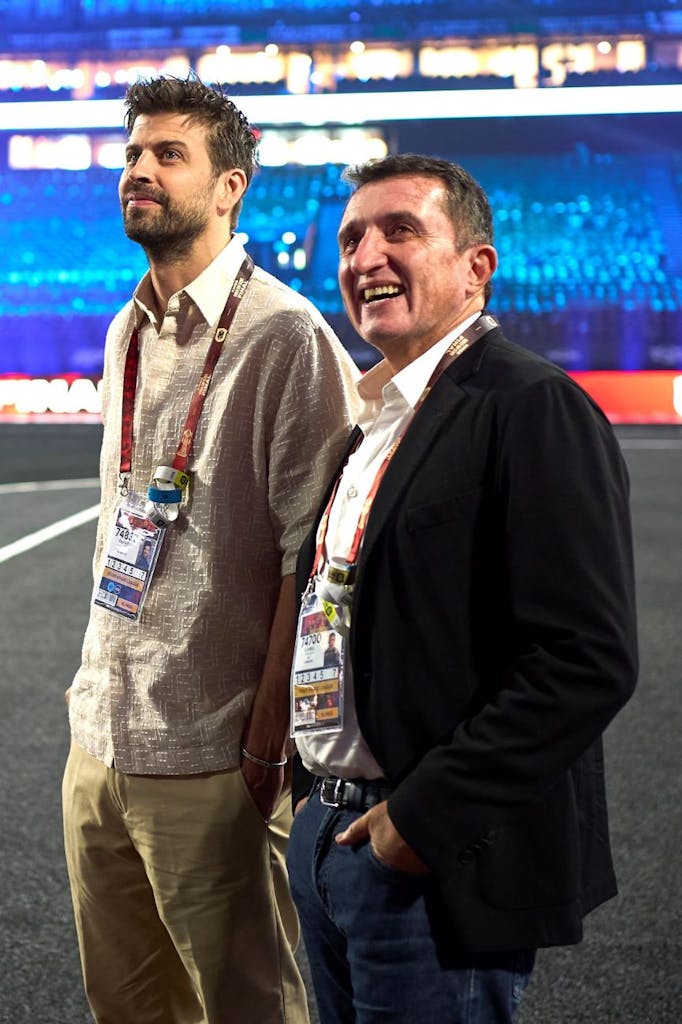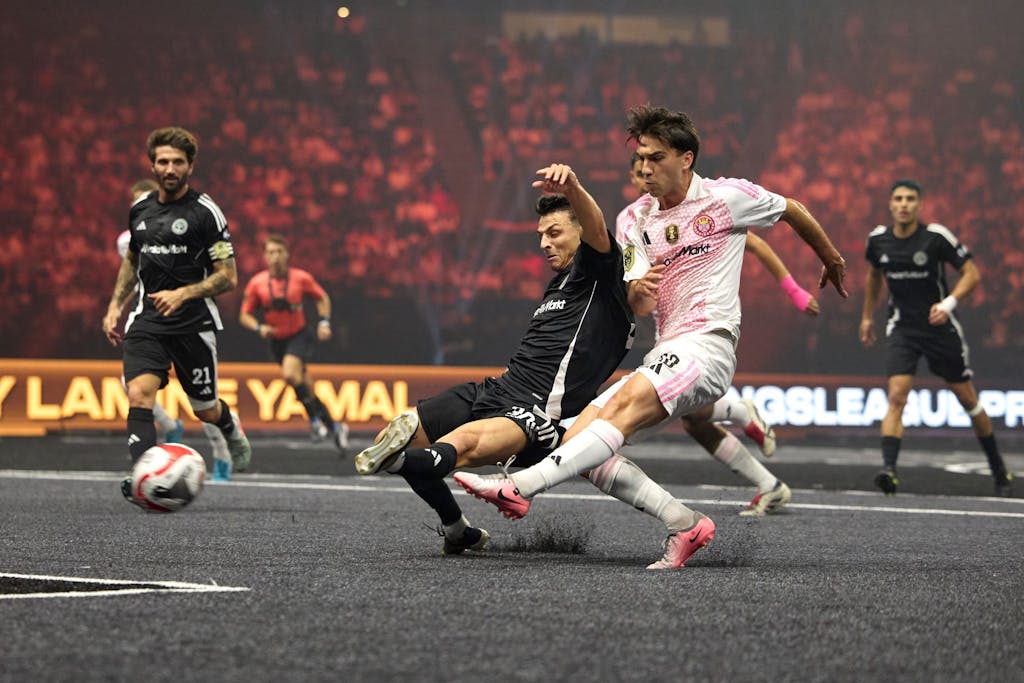
Reach vs revenue. Exposure vs exclusivity. In the perennial question of sports media distribution strategy, the seven-a-side Kings League has charted a clear path, with less than five per cent of its income deriving from media rights.
Kings League’s founder and president is Gerard Piqué, the former FC Barcelona and Spain player. He and chief executive Djamel Agaoua outlined the property’s approach to SportBusiness in Paris on Saturday (June 14), ahead of the two-and-a-half year old competition’s Kings World Cup Clubs final at La Défense Arena.
Agaoua stated that sponsorship revenues account for 65 to 70 per cent of the property’s overall revenues at present. In new leagues it has launched this year, that figure rises to 70 to 75 per cent, as time to activate other sources of income, such as ticketing, merchandising and licensing, has been limited.
Kings League is also working on other revenue streams, such as monetising its data to sell on to betting operators.
But sponsorship dominates – a ratio which is likely to endure, given the property’s commercial structure.
Brand partners to date have included: Adidas, which produces all the kits and balls; Cupra, the naming partner for arenas; and JD Sports, whose logo adorns the huge dice which are rolled to decide how many players appear for each side for the final two minutes of the first half. The Kings World Cup Clubs also saw activations from Burger King, Fortnite and Bazr, among others.
For Agaoua, Kings League offers a rare opportunity to target Gen Z and Gen Alpha with effective marketing. “This generation, they are not consuming the image of a brand, they want interaction and involvement,” he said.
Kings League states that from January 2024 to January 2025, it received 14 billion brand impressions. The Kings World Cup Nations, held in Italy at the start of this year, reached a peak viewership of 6 million. Monetising such digital audiences is, of course, a challenge for media companies, but Agaoua believes Kings League has an advantage.
“We are producing billions of impressions but in a way that is organic,” he said. “It’s not something which is intrusive for the young generation.”
Kings League’s sponsorship-heavy approach is built in to both its ownership and standard viewership model. Most teams are owned by streamers, and it is through their streams that most viewers watch live Kings League matches.
It is these team presidents that perhaps command the most loyalty and engagement, more so than the players.
Piqué said he had received a call from Brazilian football star Neymar, owner of a Brazilian Kings League team, just prior to the Kings World Cup Clubs semi-final. Piqué said his ex-teammate declared he’d jump on a private plane to attend the final if his team made it through. Neymar had planned to take a penalty – club presidents being able to do this is one of the many innovations which perhaps irk traditional football fans, but which Piqué and Agaoua say is central to their disruptive approach. Ultimately, Neymar’s team failed to qualify.
Streamer-led distribution
Streamers such as Spaniard Ibai Llanos, who has been part of the project since its inception, draw in most of the Kings League digital audience.
Coverage and highlights on YouTube and impressions on social media platforms, particularly TikTok and Instagram, are key distribution avenues for the property. However, Amazon-owned Twitch is considered the best-suited platform for the Kings League due its combination of providing live coverage alongside interaction.
Where established linear distributors do come in – for the Kings World Cup Clubs, these included Sky Italia and ESPN Latin America – Kings League’s main objective is for the broadcasters to help communicate the concept and different rules.
Though media rights revenues might grow from the current fractional percentage, Kings League has no plans to follow the standard model.
Agaoua said: “One of the issues that professional sports has everywhere is the fact that audiences are not in front of the big screen anymore. This is even more true in emerging markets – there are loads of kids that don’t have a TV, they just use their phone.
“When you think that professional sports is financed 75 to 80 per cent by traditional media, everybody knows that at some point there will be a change in the balance. It just doesn’t fly. Everyone is projecting a nice growth of 10 per cent a year, but when you look at audience, it is declining five per cent a year. This is the average – when you look at the young audience, it is more than that.”
Piqué proudly states that “85 per cent of our audience is under 35″. There are no qualms about the medium-blurring qualities of the property, with Piqué happily referencing the video-game-like quality of the overall product.

Markets
“We want a full league played in the US before the 2026 Fifa World Cup,” Agaoua said, suggesting the end of this year or the start of next year as possible dates.
The US would add to leagues already in operation in Spain, Mexico, Italy, Brazil, France, and Germany. The Kings World Cup Clubs has now joined the Kings World Cup Nations as an international event. There is also the women’s Queens League, which had its own World Cup Clubs final on June 13.
Kings League states its two oldest editions, in Spain and Mexico, are profitable, but expanding into a new market generally costs between €5m ($5.8m) to €7m, Agaoua said.
However, the proposed US expansion will require a lot more investment. “Marketing is five times more expensive in the US,” he explained, due to far higher outlays such as cost per mille and venue hire.
Likely to start on the east coast for operational reasons, Kings League has begun recruiting for the US operation. At present the company has close to 300 staff, with half based at its Barcelona office.
Germany was the most recent league set up in Europe, and differs from other markets for two main reasons. Firstly, media conglomerate Bertelsmann, majority owner of RTL Group, is a major investor in in the German edition. Secondly, there is significant local competition in the form of Baller League as well as the Icon League, set up by World Cup-winner Toni Kroos and Elias Nerlich, one of the country’s biggest streamers. Agaoua describes both as “copycats” and says Kings League’s audience is higher than the competition in the market.
The first edition in the Middle East and North Africa is slated for this autumn, following last month’s announcement of a joint venture with Saudi Arabia’s SURJ Sports Investment. Riyadh will host the tournament, which will feature teams from across the region.
The UK, for now, remains unlikely as a Kings League location, with Agaoua pointing to the relatively low usage of Twitch in the country compared to the likes of Spain, among several other factors. However, Agaoua said “this doesn’t mean we’ll never go to the UK”.
The UK contrasts with a market such as Brazil. Both have hugely passionate football fanbases, but in Brazil watching even top-tier football via the medium of a streamer is now normalised. Non-exclusive coverage of the 2022 Fifa World Cup was shown on CazéTV, the Brazilian streaming platform owned by the LiveMode agency and Brazilian influencer Casimiro.
Pivot to IP
Piqué previously set up the invesment vehicle Kosmos, which has worked as a media rights agency though its most significant deal was an all-encompassing agreement for the Davis Cup. The $3bn, 25-year agreement with the International Tennis Federation to run and commercialise the competition was terminated at the start of 2023 following unsuccessful attempts to renegotiate the deal.
Piqué’s focus on Kings League appears to be in keeping with a wider trend in the industry of owning and operating one’s own intellectual property.
Expansion is in full swing, facilitated by a €60m funding round last year from the likes of venture capital firm Left Lane Capital and Fillip, a Mexico-based holding company. Venture capital fund Cassius had previously been the only outside investor.
The profitability of clubs “is an obsession” for Kings League, Piqué told SportBusiness. He added that most clubs are currently profitable, highlighting salary caps and having closed leagues as key factors in keeping costs low to ensure solid margins. “We own the whole pyramid, it’s much easier for us.”
In this context, Piqué eyes Kings League clubs as potentially being a better investment going forward compared to standard football clubs, which are largely loss-making.
Troncos FC, which won the final on Saturday night, previously sold a 15-per-cent stake for $600,000.

Complementary to ‘normal’ football
“We are complementary to football”, Piqué insists, and collaboration with conventional teams and players is growing.
Juventus works with Zebras FC, a Kings League Italy side led by streamer Luca Campolunghi. 17-year-old Spanish superstar Lamine Yamal started as a fan, watching Kings League aged 15. He now also owns a team, and was involved in the property’s tie-up with Adidas. LaLiga president Javier Tebas previously dismissed Kings League as a “circus”, though it is understood the relationship is now productive and collaborative.
Tebas is a long-standing advocate for better anti-piracy measures, seeing the issue as the biggest existential risk to the sports ecosystem.
In a sense, Kings League is piracy-proof, given its overwhelming strategy is to reach as many eyeballs as possible, and its media rights approach is to go non-exclusive.
Asked about this, Pique emphasised the centrality of streamers as an intermediary between the game and fans. “If they [streamers] feel the project is their project… this will create a very strong level of engagement. At the same time, we put the audience at the centre.” On the latter point, fans have a strong say in changes to the product. This has even included voting on the colour of the pitch, which is now a distinctive black.
Overall, Piqué, who won everything in football, acknowledges that marquee events such as Uefa Champions League semi-finals and finals remain the pinnacle of the game as both a sport and entertainment. But beyond this, he and his team are catering to what they see as a rising demand for shorter matches – Kings League games are 40 minutes – and more engaging content, which includes teams deploying ‘secret cards’ to shake up the action.
Fans can, of course, be resistant to change, as was demonstrated when the Super League was emphatically rejected by traditional football supporters. But what might be termed the sport’s ‘Streamer League’, fuelled by youthful engagement, is here to stay.